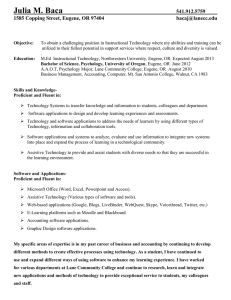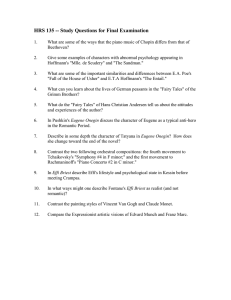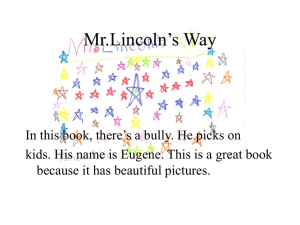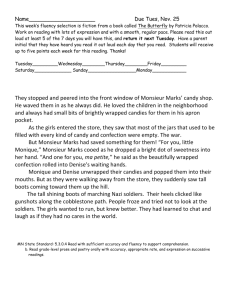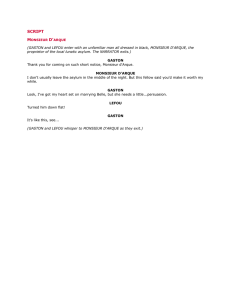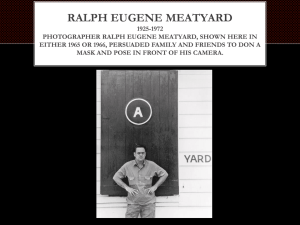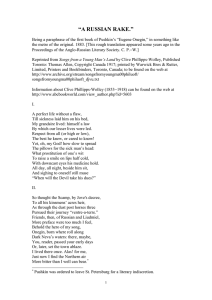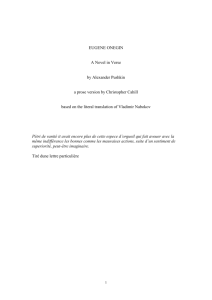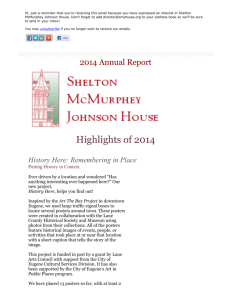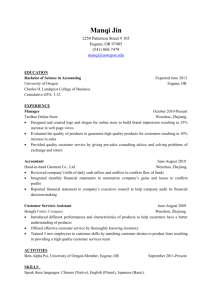Hewitt
advertisement
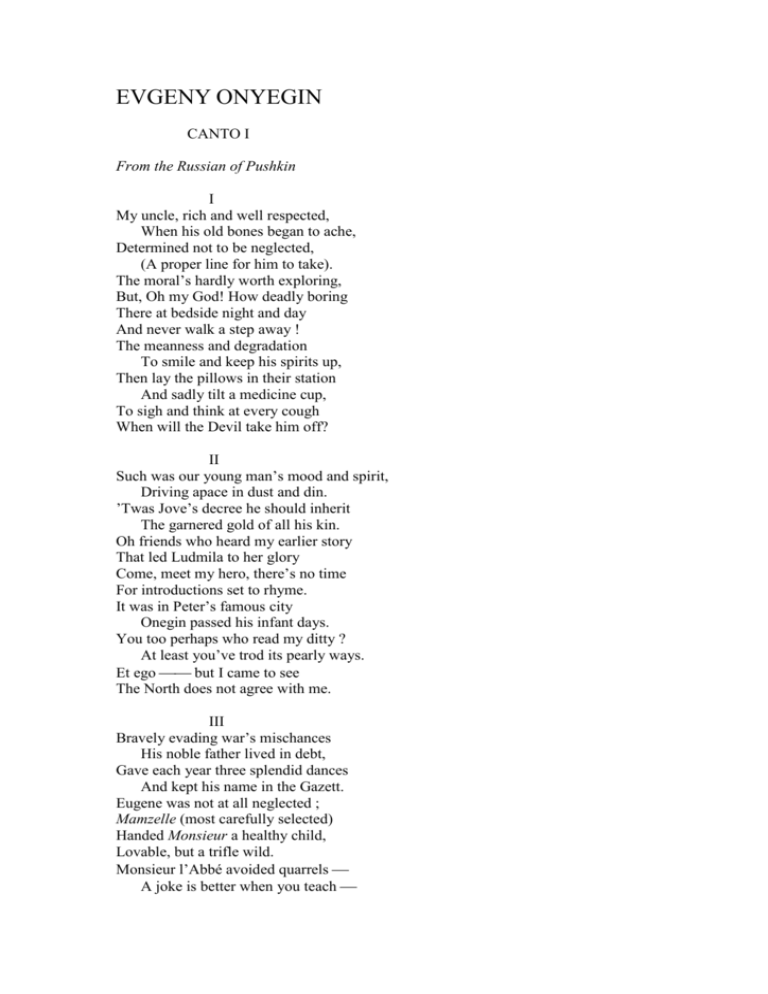
EVGENY ONYEGIN CANTO I From the Russian of Pushkin I My uncle, rich and well respected, When his old bones began to ache, Determined not to be neglected, (A proper line for him to take). The moral’s hardly worth exploring, But, Oh my God! How deadly boring There at bedside night and day And never walk a step away ! The meanness and degradation To smile and keep his spirits up, Then lay the pillows in their station And sadly tilt a medicine cup, To sigh and think at every cough When will the Devil take him off? II Such was our young man’s mood and spirit, Driving apace in dust and din. ’Twas Jove’s decree he should inherit The garnered gold of all his kin. Oh friends who heard my earlier story That led Ludmila to her glory Come, meet my hero, there’s no time For introductions set to rhyme. It was in Peter’s famous city Onegin passed his infant days. You too perhaps who read my ditty ? At least you’ve trod its pearly ways. Et ego but I came to see The North does not agree with me. III Bravely evading war’s mischances His noble father lived in debt, Gave each year three splendid dances And kept his name in the Gazett. Eugene was not at all neglected ; Mamzelle (most carefully selected) Handed Monsieur a healthy child, Lovable, but a trifle wild. Monsieur l’Abbé avoided quarrels A joke is better when you teach Never insisted much on morals, Or grew emphatic in his speech. He could not bite and would not bark. When ambling round the Summer Park. IV The years of boyhood duly ended, Monsieur departed from the scene, While hope and melancholy blended Excited and dismayed Eugene. Freedom at last, and money handy, He dressed like a London dandy, Hair a la mode, divinely curled, And sallies forth to view the world. He was equipped for good society. Spoke French (and wrote it) with esprit, Led a mazurka with propriety, And bowed to just the right degree, Everything that in brief is meant By charming and intelligent. V We all take up our spot of learning Somehow or other, God knows how ! Enough to keep the brain from turning And leave a polish on the brow. Experienced critics, unromantic, Labelled him clever but pedantic, And yet he knew the art to please, To listen and converse with ease. Whate’er the theme, it never found him In dull and unresponsive mood, And if the topic grew beyond him He smiled as if he understood, And earned a tribute from Madame By an unlooked-for epigram. VI The Classics now are out of fashion, Let no-one therefore think the worse Of Eugene that he had no passion For Latin grammar, prose or verse. He had been known occasionally To round a letter off with Vale, And greatly daring to translate An epigraph with name and date. He saw no point in archaeology, Where dust and dirt have settled long, And all he kept of this philology Was tags of Virgil (quoted wrong) And little stories, grave and gay, From Tarquin to the present day. VII As to the tender melting lyric, Its music never reached his heart, What are Iambus, Trochee, Pyrric, To one who know them not apart ? In place of honouring the Muses An economic work he chooses, And with a grave judicious air Deciphers in an easy chair That complicated and ethereal Legend that Adam Smith has told, How if the State has raw material A people may dispense with gold. His father did not understand, And mortgaged the remaining land. VIII I fear that it would try your patience To tell you all the things he knew. It was not always Wealth of Nations, He had a nobler aim in view. Had marked it down while still aboy, His one complaint, his only joy, With more than dictatorial might Ruling his thought both day and night. Amour ? Of course, I knew you’d say so, The swelling theme, the gentle crime, That ruined the melodious Naso And snuffed him out before his time, All by the barren Pontic foam, Far distant from his hearth and home. IX X He soon revealed a natural talent, Adopting the Protean style, Could turn from ingenu to gallant Or turn the villain with a smile : Be sympathique and confidential, Not losing sight of the essential, Keep silent for an hour, and then Be the most eloquent of men. His artless billet-doux included As much of love as words will hold, Never a hint of self intruded : His eye was moist, his look was bold, And more than once he drew quite near To dropping an authentic tear. XI Despairing accents low and broken Are certain of their destined aim, A modest equivoke well spoken Can set a virgin heart aflame. Innocent is she ? Or retaining Prejudice from an early training ? Watch for the moment when she cares, There is a tide in these affairs. A challenge now. By way of trial Secure a private rendezvous. The hunt is up. Brook no denial. The field of love is clear to view. So to the culminating date, When you instruct her tête à tête. XII Eugene could stir a tender feeling In the coquette expert in arms, And neatly deal a wound past healing To any rival for her charms ; Bonmots that raised an instant tetter, His booby-traps were even better, Yet happy husbands, all the same, Asked him to dinner and he came. Such Faublas’ friend and life-long student (A knowing and accomplished spouse), Timorous Greybeard (how imprudent !) And Magnus of the antlered brows, When no complaint about his life, Himself, his dinner, or his wife. (XIII, XIV) XV Awake at last, the sun is shining, Three invitations on the tray. A children’s party, dancing, dining, Are all attractive in their way. A problem, though, a bore, a worry, Not to be settled in a hurry ; Which to begin with ? I declare One really can’t go everywhere ! Meanwhile, as fresh as any flower, In a loose-fitting Bolivar, Onegin spends a thoughtless hour Sauntering down the boulevard. The day glides on. It won’t be long Before the punctual dinner-gong. Translated by Reginald Mainwaring Hewitt From Reginald Mainwaring Hewitt (1887-1948): A Selection from His Remains, edited by V. de S. Pinto, 120-25. Oxford: Printed for the Subscribers by Blackwell, 1955. Originally published in The Gong, the magazine of the students of Nottingham University College (British Library Shelfmark P.P.6122.aa).
